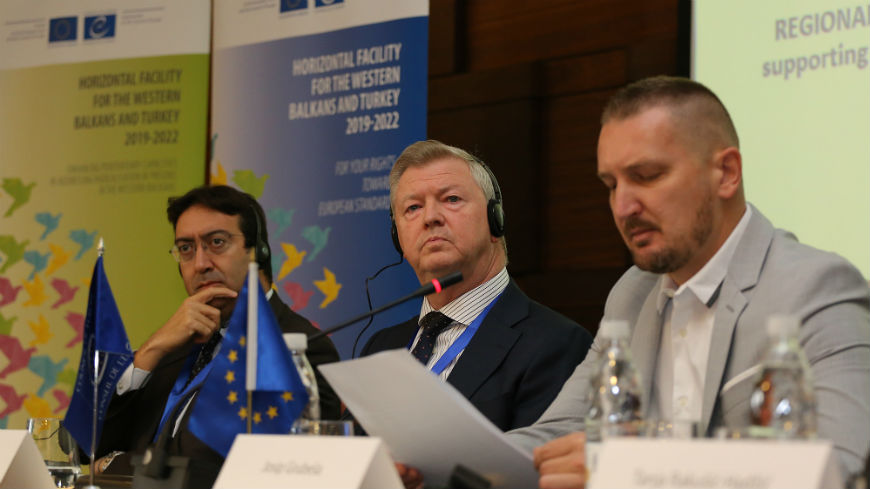The growing number of violent extremist offenders, including foreign terrorists fighters, in prisons in the Western Balkans calls for reconsidering the existing measures and common approaches to dealing with this category of inmates, concluded the participants of the conference “Facilitating regional collaboration on addressing radicalisation in prisons and supporting the authorities in overcoming the main challenges of the penitentiary systems in the Western Balkans region”, which took place in Sarajevo today.
The regional conference, which gathered more than 80 prison practitioners, probation officers and countering violent extremism representatives from Albania, Bosnia and Herzegovina, Kosovo*, Montenegro, North Macedonia and Serbia, marked the launch of the project, entitled “Enhancing penitentiary capacities in addressing radicalisation in prisons in Western Balkans”. Its main goal is to contribute to improving regional security by tackling the radicalisation in prisons and disengaging extremist prisoners from violence.
Josip Grubeša, Minister of Justice of Bosnia and Herzegovina pointed out that the complexity of the issue requires regional co-operation and exchange of good practices in order to maintain the well-functioning rule of law when dealing with this type of criminal offenders. Through its institutional and legislative reforms, Bosnia and Herzegovina has already demonstrated its commitment to actively fighting any type of terrorism and radicalisation. However, special attention still needs to be paid to close co-ordination of activities at all levels in Bosnia and Herzegovina as well as to the development of international co-operation in fighting against terrorism and radicalisation, in particular with EU member states, the USA, and countries in the region, Minister Grubeša concluded.
The project "Enhancing penitentiary capacities in addressing radicalisation in prisons in Western Balkans" is funded by the European Union and the Council of Europe in the amount of €2 million and will run until May 2022.
The project will be directly supporting the implementation of the Joint Action Plan on Counter-Terrorism for the Western Balkans signed in Tirana in October 2018. The plan entails the need to implement effective measures to address prison radicalisation, including in the areas of prevention, disengagement, rehabilitation, reintegration as well as the management and follow-up support to terrorist convicts released from prison and other released convicts who may have been radicalised in prison, said Filip De Ceuninck, EU regional Counter-Terrorism Advisor from EU Delegation in Sarajevo. Training of relevant actors, such as law enforcement officers, prison staff and probation officers, should be adequately provided, he concluded.
Gianluca Esposito, Head of the Action against Crime Department of the Council of Europe, stated that the Action is aimed at initiating an effective and sustainable co-operation among prison and probation practitioners across the region. Strong co-ordination is a must. The role of the co-ordination mechanisms in countering violent extremism is essential, since they have continuous oversight of all the counter extremism-related activities implemented at Beneficiary level, said Esposito.
The project is implemented under the Horizontal Facility Programme 2019-2022, funded by the European Union and the Council of Europe.

* This designation is without prejudice to positions on status and is in line with UNSCR 1244 and the ICJ Opinion on the Kosovo Declaration of Independence.

